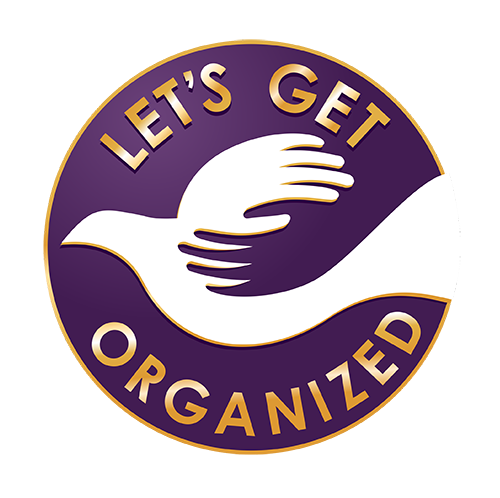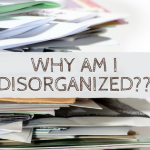As a professional organizer, I often hear, “I just can’t get it together. Why am I so disorganized?” The answer could be any number of things. Each individual is unique and faces his or her own individual organizing challenges. Sometimes, before we can organize a physical space, we have to organize what’s going on in our minds and hearts.
You could be facing a physical challenge, such as impaired mobility, chronic fatigue syndrome, or a sleep disorder. Living with challenges such as these can make creating and maintaining effective organizing systems very difficult. You may not be able to move around well or quickly, and you may not have sustained energy for relatively long periods of time (like 2 to 3 hours), so things can easily pile up.
If you are a woman of a certain age, you may be in perimenopause, when estrogen levels drop, contributing to organizing challenges.
Your decision-making skills may be impaired by brain-based challenges such as ADHD, fibromyalgia, or a traumatic brain injury. You could be living with mental health issues, such as depression, an anxiety disorder, or OCD.
Maybe you were never taught organizing skills at home or in school. Perhaps you grew up in a house that was hoarded. Could you have experienced multiple losses, traumas, or life transitions? The list goes on.
If you are facing challenges that prevent you from gaining control over your organizing systems, the first thing you can do is be kind to yourself. You may not have asked for your circumstances, and beating yourself up over not being able to get organized can make you feel worse about yourself. So free your mind, even if just a little bit. Practice positive self talk; accentuate what you like about yourself.
The next thing you can do is practice good self-care. This is usually commonly known advice, such as eat a balanced diet, stay hydrated, get some exercise, and interact with people you like. Listen to good music. An important aspect of mental health that we often forget is our relationships with animals. If you can care for a pet, even as simple as a fish, consider getting one. Below is a mind map of what I call The LGO Focus FormulaTM. This is advice I give to every one of my clients when they get overwhelmed. Paying attention to your basic needs gives you a strong foundation for higher-level thinking, like making decisions, a critical component of organizing.
Another suggestion is to enlist an organizing buddy. Many clients of professional organizers say, “I could never have done this without you!” Sometimes just having another person in your space helps to make what may seem like a boring and lonely task much more fun and interesting. If your budget doesn’t allow you to work with a PO, ask a non-judgmental family member or friend to keep you company while you open mail and pay bills, help you clean out the garage, or rearrange cabinets so you can reach what you need on a daily basis more easily. This is a technique called “Body Doubling” in the organizing world.
So if you are facing physical, neurological, or emotional challenges that keep you from getting organized, remember to be kind to yourself. Take good care of your body, stimulate your mind, and surround yourself with people and pets who bring you joy.
Note: Some information in this article is based on ICD Fact Sheet 004, written by Phyllis Flood Knerr, CPO-CD®, © 2010, Institute for Challenging Disorganization, www.challengingdisorganization.org.

